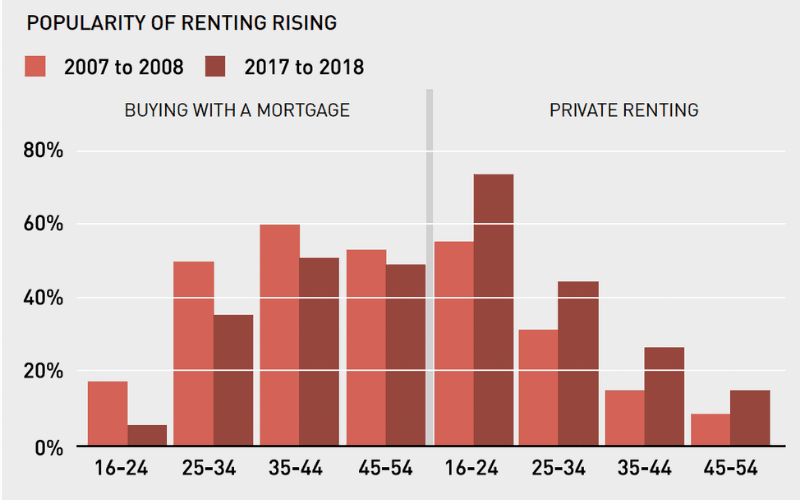No renter in either social or private accommodation will be forced out of their home
More than a fifth of UK households live in privately rented accommodation. The Government has introduced measures to protect renters affected by coronavirus (COVID-19). This radical package of measures protects renters and landlords affected by coronavirus – and with these in force, no renter in either social or private accommodation will be forced out of their home.
Homeowning v private renting by age group

Serving notice to end the tenancy
From 26 March 2020, landlords now have to give all renters three months’ notice if they intend to seek possession, serving notice that they want to end the tenancy. This means the landlord can’t apply to start the court process until after this period. This extended period will apply in law until 30 September 2020, and both the end point and the three-month notice period can be extended if needed.
This protection covers most tenants in the private and social rented sectors in England and Wales, and all grounds of evictions. This includes possession of tenancies in the Rent Act 1977, the Housing Act 1985, the Housing Act 1996 and the Housing Act 1988. After three months, if the tenant has not moved, a landlord needs to apply to court in order to proceed.
Evictions during period of national crisis
From 26 March 2020, landlords now have to give all renters three months’ notice if they intend to seek possession, serving notice that they want to end the tenancy. This means the landlord can’t Most renters in the UK are on what are known as ‘assured shorthold tenancy agreements’. Assured shorthold tenants can usually be evicted at short notice. A landlord can serve a tenant with what’s known as a ‘section 8 eviction notice’ as soon as they are eight weeks behind with rent. Normally, you will then have 14 days’ notice.
A different kind of notice called a ‘section 21’ can also be served without giving a reason. The tenant usually has two months to leave the property, but the notice period can be longer. A landlord cannot begin either of these types of eviction until the period of national crisis ends.
Housing possession action suspended
From 27 March 2020, the court service suspended all ongoing housing possession action – this means that neither cases currently in the system or any about to go into it can progress to the stage where someone could be evicted.
This suspension of housing possessions action will initially last for 90 days, but this can be extended if needed. This measure will protect all private and social renters, as well as those with mortgages and those with licenses covered by the Protection from Eviction Act 1977. This will apply to both England and Wales.
Facing financial hardship and struggling to pay
Tenants are still liable for their rent and should pay this as usual. If you are a tenant facing financial hardship and struggling to pay this, support is available. In the first instance, you should speak to your landlord if you think you will have difficulty meeting a rental payment.
Explain the situation and ask for more time to pay, or ask to catch up any missed payments by instalments, and discuss with them an option to put in place a rent payment scheme. Don’t offer to pay more than you can realistically afford, as this could make the problem worse if you can’t keep up with your payments.
The Government has made £500 million available to fund households experiencing financial hardship. And as part of the workers’ support package, the Chancellor, Rishi Sunak, announced the Government will pay up to 80% of a worker’s wages, up to a total of £2,500 per month, where workers are placed on the Coronavirus Job Retention Scheme.
Positive partnership between tenants and landlords
These government measures are aimed at alleviating the concerns of many landlords who might be worried about meeting mortgage payments, and should therefore mean no unnecessary pressure is put on their tenants. In addition, both Universal Credit and Housing Benefit increased from April, and Local Housing Allowance rates will now pay for at least 30% of market rents in each area.
To further support landlords, and to maintain the positive partnership between tenants and their landlords, the Government have agreed with lenders that they will ensure support is available where it is needed for landlords. Landlords will also be protected by a three-month mortgage payment holiday where they have a buy-to-let mortgage.
Urgent, essential health and safety repairs to be made
During the period of uncertainty, landlords still remain legally obligated to ensure properties meet the required standard – urgent, essential health and safety repairs should be made. An agreement for non-urgent repairs to be done later should be made between tenants and landlords.
The Government is expecting landlords and tenants to work together to establish affordable repayment plans after the crisis. The measures will give tenants and landlords much greater confidence that rents can be paid through the COVID-19 crisis.
